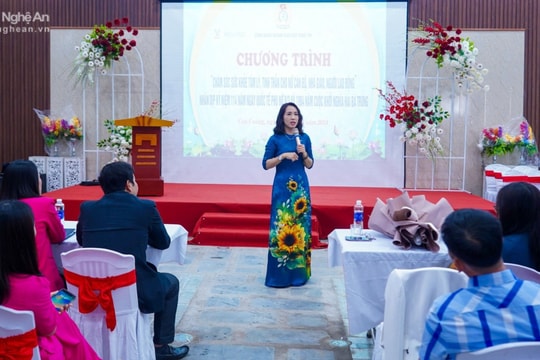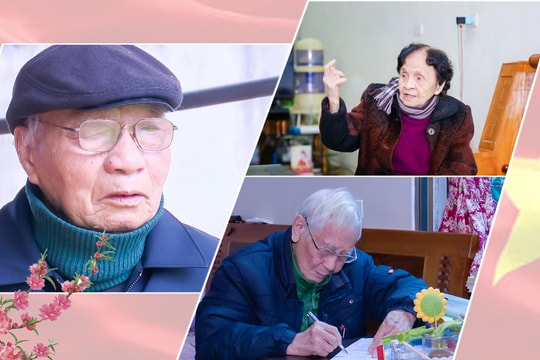Proposing a regime of treatment and honor for teachers in the Law on Teachers
The Ministry of Education and Training proposed two solutions related to the treatment and honor of teachers in the Report on assessing the impact of the policy proposing the development of the Law on Teachers.
Degreeforce to attract good people to become teachers
Emphasizing some shortcomings, the Report stated: The preferential allowance policies for teachers in the Law on Education are only "declarative" and cannot be directly applied in practice due to the lack of effective mechanisms for the Government, the Ministry of Home Affairs, the Ministry of Finance, the governing ministries and the People's Committees of localities to uniformly implement these regulations.
Education management staff who are mobilized, elected, appointed, promoted, or seconded (who were previously teachers working at educational and training institutions) have not yet received seniority allowances for teachers, leading to difficulties in mobilizing and appointing teachers from educational institutions to the Department of Education and Training and the Department of Education and Training.
The phenomenon of teachers leaving the profession after being trained abroad with state budget, or transferring to another training institution after being trained with the training institution's budget, is quite common, but there is confusion in requesting reimbursement of training costs.
The goal of the policy is to identify issues in the treatment, honor, and reward of teachers, to motivate talented people to become teachers, and to motivate teachers who have entered the profession to dedicate themselves and be dedicated to their profession;
At the same time, strengthen the treatment regime for teachers, establish a classification mechanism to ensure fair treatment, those who work hard will be treated well, build a salary distribution regime and promotion opportunities, increase salaries and treatment for those with outstanding achievements;
On the other hand, implementing requirements to reduce the burden on teachers, ensuring that teachers can confidently devote themselves to teaching and educating people.

Propose 2 solutions
To solve the problem, the Ministry of Education and Training proposed 2 solutions: Maintain the current regulations of related Laws (solution 1); synchronously and uniformly regulate issues of treatment and honoring teachers in a separate Law (solution 2). Specifically:
The first,Identify basic issues on salary policy, allowances, subsidies, retirement regimes, medical examination and treatment, and social insurance for teachers.
Monday,determine policies for teachers working in special schools,remote areas, areas of special socio-economic difficulty.
Tuesday,Determine support policies on housing and public housing for teachers.
Wednesday,specify the competition and reward criteria for teachers.
Assess the impact of solutions
The Ministry of Education and Training has assessed the impact of solutions on subjects directly affected by the policy and other related subjects.
For solution 1, the impact on society is: When there is no separate policy, teachers will not be able to assert their position in society. Many students do not have the passion to take the entrance exam to teacher training colleges, leading to the possibility of a shortage of teachers in the future.
On the impact on the law:There are too many sub-law documents regulating policies for teachers, but they do not ensure fairness and do not promote the capacity and dedication of each teacher.
On economic impact:The treatment of teachers is still low, while the work pressure is high, leading to many teachers having expertise and capacity but not enough patience to dedicate themselves to the profession.
Gender and human rights impacts,The limitation of this solution is that the ratio of female teachers is higher than that of male teachers because many female teachers choose jobs related to family conditions rather than career passion.
For solution 2.The legal impact of the solution is: This amendment is consistent with the Party and State's guidelines and policies, institutionalizing the Party's viewpoint on educational innovation in documents such as Resolution No. 29 of the Party Central Committee on comprehensive fundamental innovation of education and training; Conclusion No. 23-KL/TW of the 5th Central Conference, 11th term on "Some issues on wages, social insurance, preferential allowances for meritorious people and reform orientations until 2020".
Social impact is:If there are laws on salary and allowance regimes for teachers that are stable, consistent and transparent, it will motivate the current teaching staff to wholeheartedly perform their functions and tasks;
Attracting talented candidates who are passionate about the profession to choose to study at teacher training colleges to supplement teaching resources, avoiding the crisis of lack of human resources to serve the education and training career.
Ensuring income level, creating social fairness between teaching profession and other professions in society
Economic-budgetary impact:The adjustment to increase salary and allowance regime for teachers (the group receiving salaries from the state budget) puts great pressure on the state budget in current conditions.
Adjusting and increasing the salary and allowance regime for teachers at private and self-financed public educational and training institutions does not affect the state budget but increases the cost of education and training for families and society and negatively affects the proportion of investment expenditure on facilities of those educational and training institutions.
The State will have to invest funds to amend relevant current Laws and sub-Laws.
Gender and human rights impacts:There are no gender and human rights impacts from the amendments to the regulations on salaries, allowances and incentives for teachers.

From the above analysis, the Ministry of Education and Training proposes to choose solution 2. Accordingly, the following contents are legalized: Supplementing regulations on salaries and allowances for teachers; supplementing regulations on retirement, medical examination and treatment and social insurance for teachers.
Supplement regulations on policies for teachers working in specialized schools, remote areas, and areas with special socio-economic difficulties; supplement regulations on conditions and procedures for housing and public housing policies for teachers; supplement regulations on criteria, emulation titles, rewards, and honors for teachers.
The Ministry of Education and Training chooses solution 2 for the following reasons: Ensuring full policies and regimes for teachers, taking into account industry-specific factors so that teachers can work with peace of mind.
Create conditions for teachers working in areas with particularly difficult socio-economic conditions to have full access to policies and special support to attract teachers to work. Create attraction for excellent students to study Pedagogy to become teachers.





